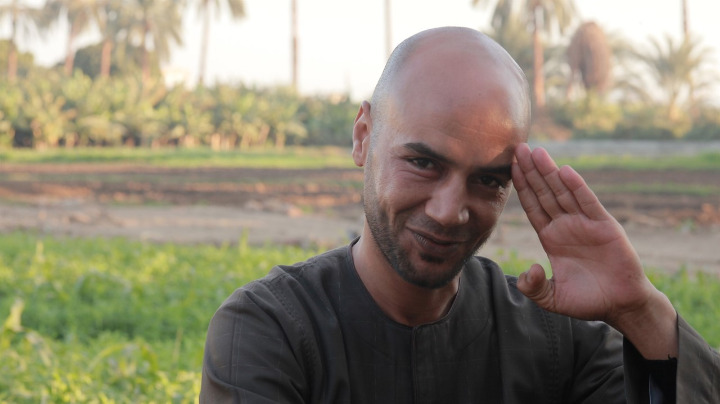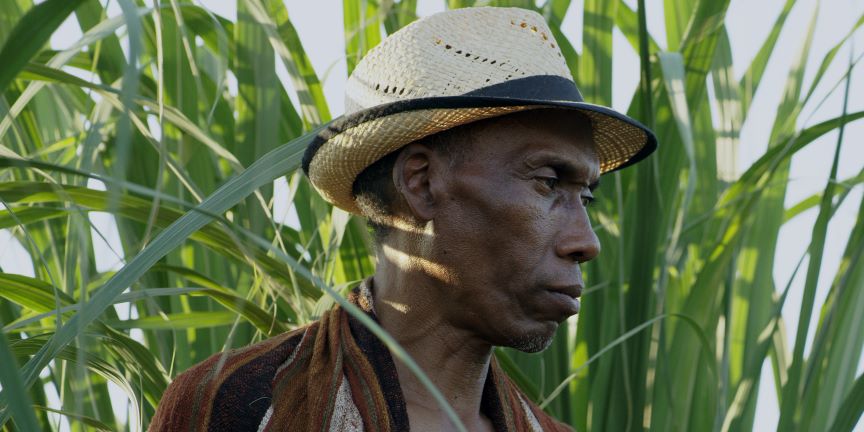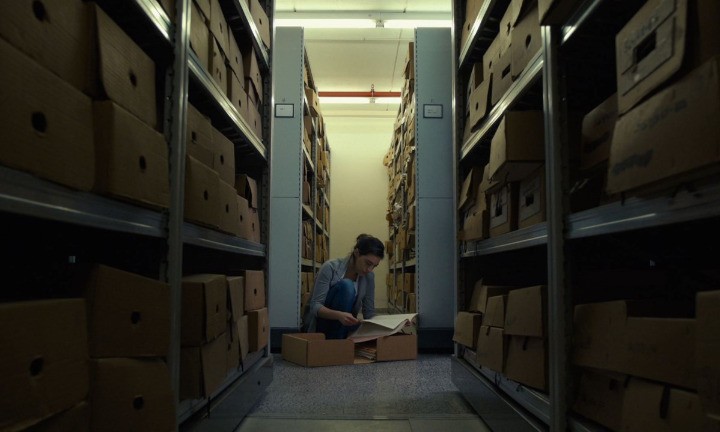In the tourist driven city of Luxor in Egypt, some marriages begin on the banks of the Nile where mature foreign women find love and companionship with local younger men. Though it isn’t quite what it seems to be. In My Mohamed is Different, director Ines Marzouk presents a candid, verité style film that follows ‘three’ mature European women as they navigate their new lives and love relationships in a mysterious world where the boundaries between business and romance seem to continuously blur.
The film’s opening scene is a close-up shot of Sarannah, a 79-year-old Scottish woman, clearly gazing at someone beyond the camera, and not directly behind it. “I love you; I love you very much…” are the first words heard. She is addressing who we gather to be her significant other. The camera closely focused on her face, her eyes tearing up, the person she is addressing unseen: it seems that all that matters at that moment is her honest declaration of love.
Arabic music begins to play, the lyrics celebrating the men of Luxor and the beautiful people of Europe, as environmental scenes paint the screen: the corniche, the Nile, the boats and the tourists. We meet Abdel-Rahim, a local tour guide, married to an Egyptian woman with two kids, and actively searching for a foreign wife. As tourism is at a low in Luxor, Abdel-Rahim and others wait for foreign women on the corniche by the Nile, in hopes of striking up a conversation around business, he says. But what exactly is this business?
Abdel-Rahim, like many other men we soon find out, is on a mission to find a foreign woman to provide him with a future, or specifically, “50,000 dollars to start my (his) life.” Walking down the streets of Luxor, Sarannah reveals that she’s had loads of marriage proposals that she suspects are all money induced. The majority of the men she’s encountered or received proposals from are very traditional in that they expect women “to be secondary somehow,” have a subdued personality, and “walk one step behind,” which is not her way. It seems that not all the men in Luxor fall under this category, albeit it is common. In some cases, the men simply have different rules for their foreign wives than those of their Egyptian wives. And in some cases, it is purely love. The point is, it’s complicated, it’s grey, it’s blurred.
Sarannah was addressing her husband of 11 years and love of her life, Hamdy, who is 30 years her junior and already has an Egyptian wife. According to him, “when you find your soulmate, you fall in love, regardless of age…” Sarannah feels she has her place, and his first wife has hers; she has no desire to change that. The two wives have different existences, however. With Hamdy’s first wife, she has to ask for his permission to do something. With Sarannah, she simply tells him what she’s doing. Hamdy explains that as tradition, just the way it is.
Something similar is the case for Sarannah’s friend Neeljte, who fell in love and married Khalid after 30 years of being in Egypt. A few years into their union, Khalid marries a second younger Egyptian wife to give him kids, and Neeljte is faced with difficult decisions. After visiting the second wife, Neeljte feels conflicted. His Egyptian wife seems to be locked in her apartment, having to ask for permission to go anywhere. The Khalid, with Neeljte, is not the same Khalid with his second wife. Neeljte feels she has two husbands; one she likes, and one she doesn’t. Again, it is what it is, it’s tradition.
Abdel-Rahim does not shy away from his more traditional, and seemingly exploitative opinions and beliefs. As the film progresses, Abdel-Rahim’s experiences and ways of representing himself increasingly divulges the more transactional and business side of some relationships with wealthy European women, and the traditional and oppressive views behind many Egyptian men. To him, moving out from his home with his Egyptian wife, “who cleans, irons and cooks for me (him), obeys me (him) even when I (he) beat her, without a word…” to marry a foreign woman has to be worth it. In essence, that means she should be willing to secure his future.
To do so, Abdel-Rahim uses an online platform to meet foreign women and uses his ‘charm’ to convince them to move to Luxor. “I put on the mask of a kind man…an honest man, a good man …it’s the best way to get what you want.” The fact that Abdel-Rahim expresses all his views and methods with a sense of confidence and pride, makes what he’s saying stir an even deeper sense of anger and disgust, as there is no sign or inkling that he feels there is anything strange or manipulative or exploitative about his approach. His reasoning is that he wasn’t the one to start this, but rather it was something that was already happening by the time he was a man. According to him, these types of unions began in the ‘80s.
Halfway through the film, Abdel-Rahim meets an older German American woman, Monica, and after a few months of online flirtation, she falls for him, moves across the world and promises to take care of him and his two children. By the end, Abdel-Rahim’s life changes: “now that I have money, and a nice house and car, people know me and like me. I became famous!”
The film follows the same structure throughout, weaving the three stories into a complicated yet confusing narrative. The camera is there to observe as Sarannah, Neeljte and Abdel-Rahim live their daily lives: there are no formal settings, no talking heads, and yet the footage comes across as unintentional and rather cluttered; as if the footage was born out of research, and not a production. Connecting these segments are environmental shots, or social scenes from the lives in the films. Director Marzouk provides a consistent structure, yet perhaps it’s needlessly uninventive and predictable. Especially because each segment seems to be the same length, each transition too – it feels rigid, as if one knows what to expect, or whom they will hear from next. The one unpredictability is the continuous search for the third women the film claimed to follow.
Monica, after much deliberation, seems to be the third woman, although her presence in the film is limited and censored. Her face is blurred, and we never hear her speak. Abdel-Rahim speaks for her, if that even is Monica. For most of the film, I searched for the third woman, and wondered why Abdel-Rahim had as much presence as Sarannah and Neeljte. Then it became obvious that the third story is Abdel-Rahim’s. There were other inconsistencies in the film that further made it frustrating to watch. Neeltje was first introduced by her husband as Neeltje, though in other parts of the film, she and the other women refer to her as Maria. And on the film’s website, she’s referred to as Nerchia, while on the film’s Facebook page, it’s back to Maria.
Although the film explores a rather interesting, unusual, and a perhaps previously under-documented cultural practice that illustrates humanity’s vulnerability, desperation and the complications of love, especially when so closely tied with business, the film’s execution let it down. The structure had a staccato rhythm to it that failed to flow, and all the while, I was trying to piece the puzzle together instead of immersing myself in the film. Any form of emotional or narrative investment was rendered impossible.
My Mohamed Is Different premiered at Hot Docs 2021.











